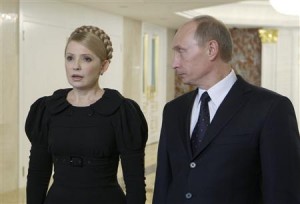 MOSCOW (Reuters) – The United States urged Russia on Sunday to resume pumping gas to Europe through Ukraine at once after finally agreeing a price for 2009 as negotiators worked on a detailed Russian-Ukrainian agreement to be signed Monday.
MOSCOW (Reuters) – The United States urged Russia on Sunday to resume pumping gas to Europe through Ukraine at once after finally agreeing a price for 2009 as negotiators worked on a detailed Russian-Ukrainian agreement to be signed Monday.
The prime ministers of Ukraine and Russia said they had agreed an outline deal that would restore gas supplies to Europe “very soon,” but the European Union said it wanted to see gas flowing before applauding.
The failure of the two ex-Soviet neighbors to agree a price for Russian gas has enraged the EU by leaving large parts of Europe without gas in the middle of winter, and has hurt Russia’s and Ukraine’s credibility as gas supplier and transit route respectively.
“Gas transit, the Ukrainian side assured us, will be restored very soon,” Russian Prime Minister Vladimir Putin said after talks that lasted into the early hours of Sunday.
The United States urged Russian gas firm Gazprom to restart gas flows “immediately” in a statement from its embassy in Kiev.
A spokeswoman for Ukrainian Prime Minister Yulia Tymoshenko said she would fly back to Moscow Monday for a signing if the respective gas companies, Gazprom and Naftogaz of Ukraine, had finalized details of the deal by then.
The firms spent the day working out details of the accord, many of which were not made public. Foreign journalists were barred from Gazprom’s Moscow headquarters.
Czech Industry Minister Martin Riman, speaking for the EU, said: “We remain realistic. Over the past few days we have seen several similarly hopeful moments. The only thing that counts for the EU is the resumption of gas supplies. For the time being it is not clear when this resumption takes place.”
ONE-YEAR DISCOUNT
After a bruising dispute that began on January 1, analysts said there were few winners.
“We will see that Europe is going to review all its energy policies pretty deeply,” said Ronald Smith, chief strategist at Alfa Bank in Moscow. “Russia has suffered some reputational damage.”
Full details of the new agreement were not given.
Putin said Moscow had agreed to give Ukraine a 20 percent discount from the price European consumers pay, on condition Kiev froze tariffs for Russian gas transit to Europe across Ukraine in 2009 at last year’s level.
“We also agreed that, starting January 1, 2010, we will fully move to gas prices and transit tariffs in line with European levels, without any reductions and discounts,” Putin said.
However, it was not clear which European market prices would be applied and what formulas would be used to determine them.
Underlining Putin’s dominance in Russian government, President Dmitry Medvedev did not attend the negotiations with Tymoshenko, and was not present when the deal was announced.
Ukraine and Russia agreed not to use intermediaries in their gas trade, a Russian government source said. Previous deals have been complicated by the use of the Swiss-based intermediary Rosukrenergo, an opaque 50/50 joint venture between Gazprom and two Ukrainian businessmen.
While Putin had full authority to seal an agreement, it remained unclear whether Tymoshenko’s domestic political rival, President Viktor Yushchenko, would respect the deal.
In Kiev, a source at Yushchenko’s office said: “We are all waiting to see the agreement. Until the agreement is in the president’s hands, he cannot make any comment on it.”
OCTOBER DEAL
Last October, Tymoshenko and Putin agreed a deal in Moscow calling for a three-year transition period after which Ukraine would pay market prices. That pact fell apart shortly after Tymoshenko returned to Kiev.
The all-night talks followed a meeting in Moscow of gas- consuming nations at the Kremlin Saturday afternoon hosted by Medvedev that did not resolve the dispute.
Russia cut off supplies to Ukraine on January 1 because it would not pay higher prices for its gas. Six days later, export flows to eastern Europe through Ukraine ceased amid Russian accusations that Kiev was “stealing” gas intended for export.
Kiev, whose economy is forecast to contract by up to 5 percent this year, says it cannot afford to pay market prices.
Gazprom wanted Ukraine to pay European-level prices of up to $450 per 1,000 cubic meters (tcm) of gas for 2009, up from $179.5 per tcm in 2008. But Ukraine, heading into its worst recession for a decade, had said it could afford only $201.
Some analysts believed that, behind closed doors, Ukraine was probably going to pay less for its gas this year than the public statements suggested.
“I doubt that it is realistic to expect Ukraine to pay a price higher than $250 per tcm,” said Jonathan Stern of the Oxford Institute for Energy Supplies.
 Eurasia Press & News
Eurasia Press & News
